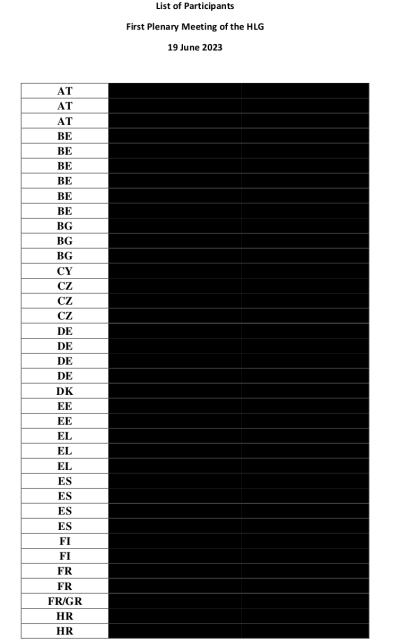Search
Items tagged with: EuGoingDark-group
#EuGoingDark surveillance plan: timeline, agenda, background
Highly controversial, non-transparent and rarely questioned: the Commission and Council of the European Union are currently preparing a new, EU-wide digital surveillance package. The plan includes the reintroduction and expansion of the retention of citizens’ communications data as well as specific proposals to undermine the secure encryption of data on all connected devices, ranging from cars to smartphones, as well as data processed by service providers and data in transit.
Behind closed doors the Commission has announced it is already preparing impact assessments and an implementation plan.
Former Pirate Party MEP and digital freedom fighter in the European Parliament Patrick Breyer comments:
“The plan is still widely unknown among citizens, journalists and politicians, even though we hold the documents in our hands and the extent of the plans is frightening. A number of questions remain unanswered.”
[strong]Documents[/strong]
Landing page about the »High-Level Group (HLG) on access to data for effective law enforcement« provides background information, press reports, documents and my view on the group’s plan.
[strong]Timeline[/strong]
- 6 June 2023: Commision decision “setting up a high-level group on access to data for effective lawenforcement”
- Between June 2023 and June 2024: Four meetings of the #EuGoingDark group and its sub-groups, partly documented on the group’s website
- 6 June 2024: Publication of the 42 recommendations of the #EuGoingDark group
- 1 July 2024: Start of the Hungarian Presidency, announcing to continue the #EuGoingDark- program („European consensus on the retention and access to law enforcementdata“)
- Announced for Q2 2024: Second Eurojust Data Retention Report
- 16 July 2024: Constituent Meeting of the European Parliament
From September 2024 onward:
- 3-5 September: Working Party on Cooperation in Criminal Matters (COPEN)
- Date tba: State of the Union speech by the President of the European Commission
- Date tba: Adoption of the Commission work programme 2025
- 10-11 October 2024: Justice and Home Affairs Council
- 16-17 October: EU -U.S. Senior Officials Meeting on Justice and Home Affairs
- 15 November: Final meeting of the #EuGoingDark group
- 25 November: Safe in Europe Forum 2024
- 27 November: Concluding report of the #EuGoingDark recommendations to be presented to the Working Party on Cooperation in Criminal Matters (COPEN)
- Date tba: Joint priorities of the EU institutions for 2025
- 9-11 December 2024: 140th Management Board Meeting of Europol
- 12-13 December 2024: Justice and Home Affairs Council with “exchange of views on Access to data for effective law enforcement”
- 1 January 2025: Beginning of the Polish Council Presidency
[strong]Open questions[/strong]
- Who participated in the meetings of the #EuGoingDark group and its sub-groups? Participant lists are still undisclosed. Mullvad VPN has reported that at least one former US secret service official has participated.
- Why were digital rights NGOs such as EDRi not invited to the meetings of the working group even when the group‘s website says it is an “[strong]collaborative and inclusive platform for stakeholders[/strong] from all relevant sectors“?
- Why aren‘t the group and its sub-groups registered in the Register of Commission Expert Groups and other similar entities (i.e. consultative entities) which would provide for significantly more transparency?
- How do the new EU Commissioners directly and indirectly involved in the issues concerned, the European Ombudsman, the data protection authorities of the EU and the member states, IT security experts, consumer protection organisations and others assess the working methods and plans of the #EuGoingDark-group?
[strong]Contacts to the group[/strong]
[strong]European Commission[/strong]
Directorate-General Migration & Home Affairs
46 Rue de Luxembourg | B-1049 Brussels | Belgium
E-Mail: EC-HLG-GOING-DARK [:at:] ec.europa.eu.
[strong]Olivier Onidi[/strong]
Deputy Director General
Directorate-General for Migration and Home Affairs
European Commission
https://www.patrick-breyer.de/en/eugoingdark-surveillance-plan-timeline-agenda-background/

Patrick Breyer (@echo_pbreyer@digitalcourage.social)
Angehängt: 1 Bild 🇬🇧 I received fully ■■■■■■ redacted participant lists of the EU’s #GoingDark anti-encryption group that is also forging plans for resurrecting #DataRetention. 👋 EU Commission , name those responsible now! https://fragdenstaat.digitalcourage.social

Public »Going Dark« Consultation: Pirate MEPs call for an end to the undemocratic surveillance forge
Content warning: The EU High-Level Group (HLG) on access to data for effective law enforcement, also known as the #EUGoingDark group, is consulting non-governmental organisations today. Newly published documents confirm criticism by Pirate Party … https://home-affairs.ec
The EU High-Level Group (HLG) on access to data for effective law enforcement, also known as the #EUGoingDark group, is consulting non-governmental organisations today. Newly published documents confirm criticism by Pirate Party Members of the European Parliament.
MEP Patrick Breyer (Pirate Party / Greens/EFA) comments:
„The #EUGoingDark work group should be dissolved! I have received the answer to my latest request for documents conceding that this group sees itself as “first step in the preparatory process of possible legislative proposals” (PDF). This makes it clear that undemocratic preliminary negotiations are conducted here with the predefined goal to re-introduce EU-wide blanket data retention of citizen’s communications data, to undermine secure encryption and to introduce the »Security by Design«-concept that should better be called »Surveilance by Design«. The group is undemocratic because NGOs and scientists are prevented from participating on an equal footing. How is equal participation supposed to work if NGOs have access neither to the actual meetings of the group and its sub-groups, nor to other participants nor to the actual work documents? It must be assumed that today’s input of NGOs has no chance of helping to shape the final result in favor of civil liberties. Meanwhile European and US-American police are forging surveillance plans behind closed doors. Belgium, for example, presented its unlawful data retention act as exemplary and spread the false claim that without data retention there is a need to resort to more intrusive methods of investigation. NGOs on the other hand, were only invited to today’s separate meeting after public pressure. The real purpose of this exercise is to keep them away from the table where the actual proposals are drafted. The results of the #EUGoingDark-group, which are to be presented as early as mid-2024, will be undemocratic and non-transparent. They must therefore not be used as legislative or political proposals. As the #EUGoingDark working group cannot achieve a useful result with this working method, the group should be dissolved.“
Marcel Kolaja, Member and Quaestor of the European Parliament for the Czech Pirate Party, comments:
“The right to privacy is a fundamental human right. Yet in recent years we have seen more and more attempts to challenge it. Whether it is the attempt to impose blanket spying on private messages or the legalisation of biometric cameras. The #EUGoingDark group is just another example of the way that many lawmakers see privacy as a burden rather than a priority. If it were a priority, we could observe a transparent debate that actively seeks out all relevant opinions. Instead, only representatives of the police or intelligence services were selectively invited, while representatives of human rights NGOs were left out. I find this practice unacceptable. The debate on privacy should be treated with the utmost respect. The #EUGoingDark group utterly fails to meet this requirement.”
Mikuláš Peksa, Member of the European Parliament for the Czech Pirate Party, comments:
“Activities and goals of this particular group present an attack on everything that keeps us safe in the online environment. We are used to see similar institutions in China’s digital dictatorship, where they persecute, bully and attack Tibetans and their fundamental rights, as well as Uighurs and other groups of citizens. In free and democratic Europe, such a thing has no place. Our private data should stay private, always.“As Pirates, we call on the Commission to ensure the right to anonymity, free speech, access to information and right to encryption to all European citizens. Those protect not only citizens from data breaches, but also whistleblowers, human rights defenders and other activists.”
Anja Hirschel, top candidate of the German Pirate Party for the 2024 European elections, comments:
“The composition of the committee, in particular the exclusion of NGOs, already clearly shows what kind of encroachments on digital freedoms citizens are to face here: Even deeper and easier access to our data. Every previously private area is to be scrutinised in future. And this is being done by a working group that has its own interests in this data and has also avoided the public eye for the preparations themselves. Instead of the next step towards transparent citizens, we need more transparent EU policy!”

Digital rights groups call for more EU transparency on law enforcement data discussions
European digital rights organisations have called in an open letter for more transparency in the experts group that will propose new data access policies for law enforcement.Roberto Ferrer (Euronews.com)

This website uses cookies to recognize revisiting and logged in users. You accept the usage of these cookies by continue browsing this website.